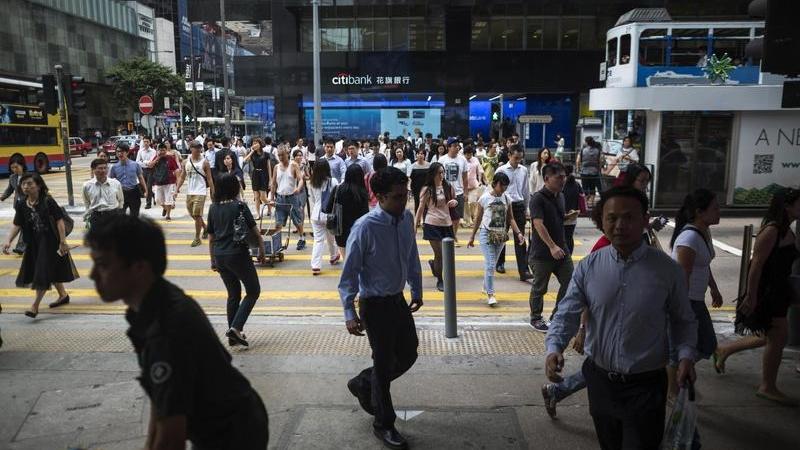 Pedestrians cross a road in front of a Citibank branch which is located in the central business district of Hong Kong. (JEROME FAVRE / BLOOMBERG)
Pedestrians cross a road in front of a Citibank branch which is located in the central business district of Hong Kong. (JEROME FAVRE / BLOOMBERG)
Major professional accounting bodies in Hong Kong, including the Hong Kong Institute of Certified Public Accountants (HKICPA) and EY, project that the Hong Kong Special Administrative Region will record a budget deficit hovering between HK$127.3 billion ($16.27 billion) and HK$148 billion for the 2023-24 financial year, almost two times higher than the government had originally forecast in February 2023.
These bodies anticipate that the city’s fiscal reserve level, by March 2024, will have further diminished to between HK$686 billion and HK$707 billion, amounting to 10 to 11 months of estimated government expenditure. In the financial years of 2017 and 2018, the fiscal reserve level amounted to 28 months of estimated government expenditure.
EY Hong Kong Financial Services Tax Leader Paul Ho argues that as Hong Kong adopts a simple and low tax system, any thoughts of introducing changes to the tax system should be considered carefully
Global auditing services firm EY and HKICPA attributed the soaring budget deficit to the decrease in land premium, slower-than-expected economic growth, and the decrease in stamp duty from the stock market and property transactions. EY believes when the macroeconomic situation improves, coupled with the administration’s prudential fiscal measures, fiscal reserves are expected to increase.
READ MORE: Chan eyes restoring fiscal balance amid ballooning deficit
With a huge budget deficit looming, EY recommends a relief package worth HK$15.2 billion for the 2024-25 financial year, compared with its suggested HK$18.3 billion for the 2023-24 financial year.
EY Hong Kong Financial Services Tax Leader Paul Ho argues that as Hong Kong adopts a simple and low tax system, any thoughts of introducing changes to the tax system should be considered carefully.
“The government should embark on extensive consultations with relevant stakeholders to weigh up the pros and cons of levying any new tax, focusing on the impact of new tax on the city’s economic competitiveness and the financial burden on Hong Kong residents,” Ho said at a news conference on Tuesday.
Ho believes capital gains tax is complex and its impacts on Hong Kong’s competitiveness need to be assessed. “Amid the current economic environment, levying a capital gains tax may bring financial pressure to taxpayers.”
“I do not recommend that the government adopt a land departure tax because it is contrary to the direction of promoting Hong Kong's integration into the Guangdong-Hong Kong-Macao Greater Bay Area and levying such a tax will also affect the flow of people and goods,” Ho noted.
The EY tax leader suggested the administration could fund more ways to increase revenue; for example, it could launch more small-sized land parcels for sale
Regarding whether the government should disburse consumption vouchers again this year, Ho said the government should gauge carefully whether this approach would achieve the desired results.
The EY tax leader suggested the administration could fund more ways to increase revenue; for example, it could launch more small-sized land parcels for sale. By attracting more small and medium-sized property developers to bid for land, it could increase land premium income for the government.
But he said that long-term megaprojects such as the Northern Metropolis and Lantau Tomorrow should not be disrupted due to short-term or cyclical economic fluctuations because these will contribute to the sustainable development of Hong Kong's economy.
READ MORE: HK starts public consultation on 2024-25 Budget
HKICPA said that while the government is keen to launch a comprehensive study regarding the competitiveness of Hong Kong’s tax system, this does not mean the administration has to levy a new tax in a short-term period.
In the current economic environment, the institute agrees that the government has to control expenditure and slash costs, but it also needs to evaluate the competitiveness of the city’s overall tax system, consider non- tax investment incentives and explore other possible sources of income.
The institute says public finances are under great pressure. It therefore recommends the government to re-examine the timetables of large or long-term projects and consider whether these projects should be adjusted or delayed before the government stabilizes its revenue sources.


